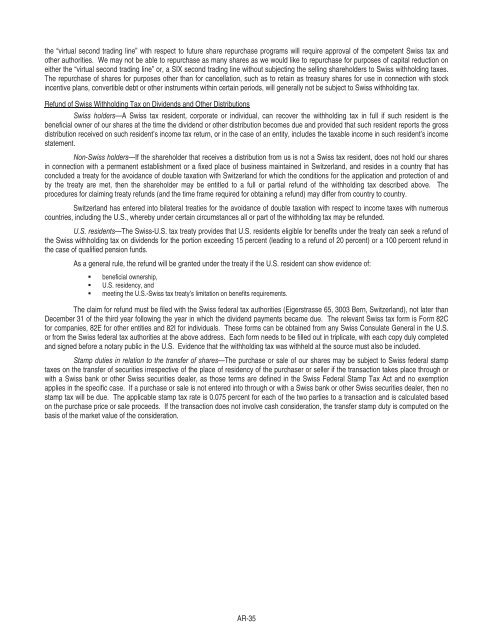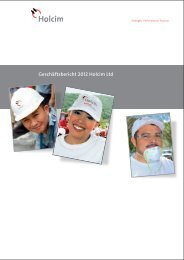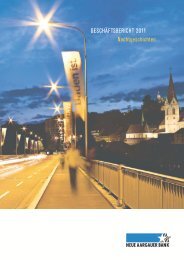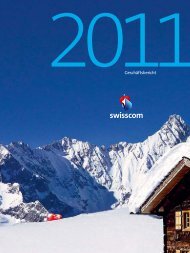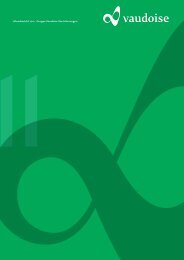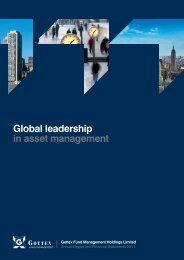Transocean Proxy Statement and 2010 Annual Report
Transocean Proxy Statement and 2010 Annual Report
Transocean Proxy Statement and 2010 Annual Report
You also want an ePaper? Increase the reach of your titles
YUMPU automatically turns print PDFs into web optimized ePapers that Google loves.
the “virtual second trading line” with respect to future share repurchase programs will require approval of the competent Swiss tax <strong>and</strong><br />
other authorities. We may not be able to repurchase as many shares as we would like to repurchase for purposes of capital reduction on<br />
either the “virtual second trading line” or, a SIX second trading line without subjecting the selling shareholders to Swiss withholding taxes.<br />
The repurchase of shares for purposes other than for cancellation, such as to retain as treasury shares for use in connection with stock<br />
incentive plans, convertible debt or other instruments within certain periods, will generally not be subject to Swiss withholding tax.<br />
Refund of Swiss Withholding Tax on Dividends <strong>and</strong> Other Distributions<br />
Swiss holders—A Swiss tax resident, corporate or individual, can recover the withholding tax in full if such resident is the<br />
beneficial owner of our shares at the time the dividend or other distribution becomes due <strong>and</strong> provided that such resident reports the gross<br />
distribution received on such resident’s income tax return, or in the case of an entity, includes the taxable income in such resident’s income<br />
statement.<br />
Non-Swiss holders—If the shareholder that receives a distribution from us is not a Swiss tax resident, does not hold our shares<br />
in connection with a permanent establishment or a fixed place of business maintained in Switzerl<strong>and</strong>, <strong>and</strong> resides in a country that has<br />
concluded a treaty for the avoidance of double taxation with Switzerl<strong>and</strong> for which the conditions for the application <strong>and</strong> protection of <strong>and</strong><br />
by the treaty are met, then the shareholder may be entitled to a full or partial refund of the withholding tax described above. The<br />
procedures for claiming treaty refunds (<strong>and</strong> the time frame required for obtaining a refund) may differ from country to country.<br />
Switzerl<strong>and</strong> has entered into bilateral treaties for the avoidance of double taxation with respect to income taxes with numerous<br />
countries, including the U.S., whereby under certain circumstances all or part of the withholding tax may be refunded.<br />
U.S. residents—The Swiss-U.S. tax treaty provides that U.S. residents eligible for benefits under the treaty can seek a refund of<br />
the Swiss withholding tax on dividends for the portion exceeding 15 percent (leading to a refund of 20 percent) or a 100 percent refund in<br />
the case of qualified pension funds.<br />
As a general rule, the refund will be granted under the treaty if the U.S. resident can show evidence of:<br />
� beneficial ownership,<br />
� U.S. residency, <strong>and</strong><br />
� meeting the U.S.-Swiss tax treaty’s limitation on benefits requirements.<br />
The claim for refund must be filed with the Swiss federal tax authorities (Eigerstrasse 65, 3003 Bern, Switzerl<strong>and</strong>), not later than<br />
December 31 of the third year following the year in which the dividend payments became due. The relevant Swiss tax form is Form 82C<br />
for companies, 82E for other entities <strong>and</strong> 82I for individuals. These forms can be obtained from any Swiss Consulate General in the U.S.<br />
or from the Swiss federal tax authorities at the above address. Each form needs to be filled out in triplicate, with each copy duly completed<br />
<strong>and</strong> signed before a notary public in the U.S. Evidence that the withholding tax was withheld at the source must also be included.<br />
Stamp duties in relation to the transfer of shares—The purchase or sale of our shares may be subject to Swiss federal stamp<br />
taxes on the transfer of securities irrespective of the place of residency of the purchaser or seller if the transaction takes place through or<br />
with a Swiss bank or other Swiss securities dealer, as those terms are defined in the Swiss Federal Stamp Tax Act <strong>and</strong> no exemption<br />
applies in the specific case. If a purchase or sale is not entered into through or with a Swiss bank or other Swiss securities dealer, then no<br />
stamp tax will be due. The applicable stamp tax rate is 0.075 percent for each of the two parties to a transaction <strong>and</strong> is calculated based<br />
on the purchase price or sale proceeds. If the transaction does not involve cash consideration, the transfer stamp duty is computed on the<br />
basis of the market value of the consideration.<br />
AR-35


